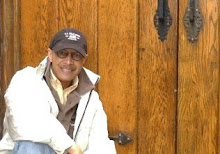
Some of the most wonderful experiences I've ever had were ones dictated purely by fate. Perhaps the greatest example was finding living space in an old gardener’s house in Bonn, Germany, the 19th largest city in that nation, located about 20 kilometers south of Cologne on the Rhine River. Bonn served as the capital from 1949 until the wall that divided East and West came down in 1990. I was there to see it all. I had met this guy living in this Bohemian-style dwelling on a previous trip to Europe and when I returned, this time to live and work there, he had ventured out on his own and rented this large, and at the time, empty house. Eventually, 3 more Germans moved in. I would find myself living in the village of Dottendorf right in the heart of one of Europe's most powerful nations political heartbeat. The Danish embassy was spitting-distance away, the headquarters of the CDU Party only a little farther than that. The red brick house that had been built in 1903 also sat only 50 meters from the main rail line running up and down what was then West Germany. My bedroom wall would shake ever eight minutes. I would never get use to it. But I would get use to the coal stoves, our gardens in the summer, and the fact that I lived only a short bike ride away from the house Beethoven had lived and died in. Robert Schumann was buried in the cemetery near the main train station. The University of Bonn had over a thousand American students attending due to the U.S. embassy there, the largest overseas. Sometimes the Rhine would flood its banks and spill over the road that winded along it. It seemed like every week there would be a motorcade with some visiting dignitary causing a traffic jam. But living in Bonn was a dream come true. I made life-long friends and learned German good enough to understand all the dubbed classic American movies on TV. And by the time the national government decided to move the capital back to Berlin in 1998, I had returned to my ordinary life in America, reading about the change in the newspaper just like everybody else. I reminded myself that the only reason Bonn had been chosen as the capital after WWII in the first place, was because the nation’s first Chancellor, Conrad Adenauer wanted the capital to be within driving distance of his home in Cologne, and because it had suffered very little damage, which I suppose is another excellent example of the workings of fate. Find out more at: http://www.bonn.de.
Visit my e-zine at: www.concelebratory.blogspot.com
and my music blog: www.copyat5.blogspot.com .
Copyright 2007 by Maurice Oliver. All Rights Reserved.


No comments:
Post a Comment